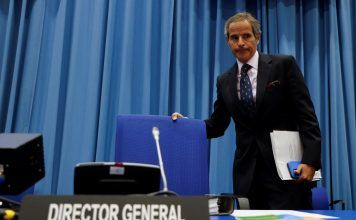[aesop_image img=”https://kayhanlife.com/wp-content/uploads/2023/07/Screenshot-2023-07-20-at-10.33.41.png” panorama=”off” credit=”Image courtesy of POLITICO” align=”center” lightbox=”on” captionsrc=”custom” caption=”Sir Richard Moore talking at the July 19 conference hosted by news outlet POLITICO ” captionposition=”left” revealfx=”off” overlay_revealfx=”off”]
Iran’s decision to supply drones to Russia to support its illegal invasion of Ukraine has “provoked internal quarrels at the highest level of the regime in Tehran,” according to Sir Richard Moore, the head of the UK’s Secret Intelligence Service (SIS) MI6.
Moore spoke at a July 19 event hosted by the Politico news outlet and its Executive Editor Anne McElvoy. The discussion covered threats to the UK posed by foreign states, the impact of artificial intelligence on global security, and the current situation in Ukraine.
The interview, which focused mostly on China and Russia, was broadcast on YouTube and watched by more than 400 people.
“Iran’s decision to supply Russia with the suicide drones that mete out random destruction to Ukraine cities has provoked internal quarrels at the highest level of the regime in Tehran,” Moore said.
“And so it should, because that decision was unconscionable. Iran seeks cash by sending arms to Russia to enable them to kill Ukrainian soldiers and civilians,” he added.
Previous reports in recent months had suggested that Iranian government disagreements about the provision of drones to Russia had emerged outside of the regime’s inner circle.
Massih Mohajeri, the editor of the Iranian state-backed Jomhouri-e Eslami newspaper, criticized the government in July 2022 for allowing Russia to use Iran’s drones against Ukraine.
Addressing Iran’s Foreign Minister Hossein Amir-Abdollahian in a front-page report published on Jomhouri-e Eslami, Mohajeri wrote: “In the first days of the war in Ukraine, why did you not tell Russia that it has no right to use Iranian drones? Furthermore, why have you not publicly condemned Russia for starting the war and why have you not redoubled your efforts to mediate between the two sides to end this evil conflict?”
A July 17 letter, shared with Kayhan Life by British conservative think tank the Policy Exchange, urged UK Foreign Secretary James Cleverly to contain perceived threats posed by Iran’s regime. The letter was written and signed by several current and former British lawmakers:
- Lord Menzies Campbell of Pittenweem, the former Leader of the Liberal Democrat party
- Sir Michael Fallon, the former UK Secretary of State for Defence
- Alicia Kearns, a conservative party lawmaker and the chair of the Commons Foreign Affairs Select Committee
- General Lord David Richards of Herstmonceux, the UK’s former Chief of Defence Staff
- Lord George Robertson of Port Ellen, a former Nato Secretary-General and former UK Secretary of State for Defence; and
- Lord Mark Sedwill, the UK’s former national security adviser and former UK cabinet secretary
“Iran is the Middle East’s largest, most aggressive power, with an obvious commitment to revising the global order, with a growing alliance with Russia and a desire to deepen it,” the letter said.
“As Iran accelerates its nuclear enrichment, the risk increases that Russia assists Iran in nuclear breakout, facilitates advanced military technological transfers, and supports Iranian intelligence activities in the UK and the EU. An Iran-Russia axis is as much a European problem, therefore, as a Middle Eastern one,” it went on.
The letter was published on the same day the Policy Exchange released its report titled, “The Iran question and British strategy.” The letter endorsed the think tank’s report and included recommendations to address national security threats by Iran.
The recommendations included: countering Iran’s intelligence operations and terrorism including within the UK; tackling illicit sources of funding for the regime; disrupting Iran’s relationship with Russia; reimposing sanctions through the 2015 nuclear deal’s snap back process; using UK intelligence agencies to highlight human rights violations in Iran; and building a military presence in the Middle East to deter Iran-led violence in the region.
The UK’s National Security Act, which was passed on July 11, provides the UK government with tools to update its counter-espionage laws and address potential threats to national security, by states such as Iran.
“Iran’s recent attempts to kidnap or kill people living in the UK are beyond contempt, and a fundamental violation of our sovereignty. The National Security Act provides the tools to expose this type of activity and hold those responsible to account,” UK Security Minister Tom Tugendhat said in a press release announcing the legislation.
The act also criminalizes individuals found to have acted covertly for states considered to be a threat to Britain’s national security. Additionally, it requires the registration of any political activity carried out by, or on behalf of foreign states, on British soil.
Kayhan Life contacted the UK Foreign Office to ask if the government planned to launch any action against Iran using the new law in the coming weeks. A spokesperson for the department said they could not confirm whether any such action was being considered.











